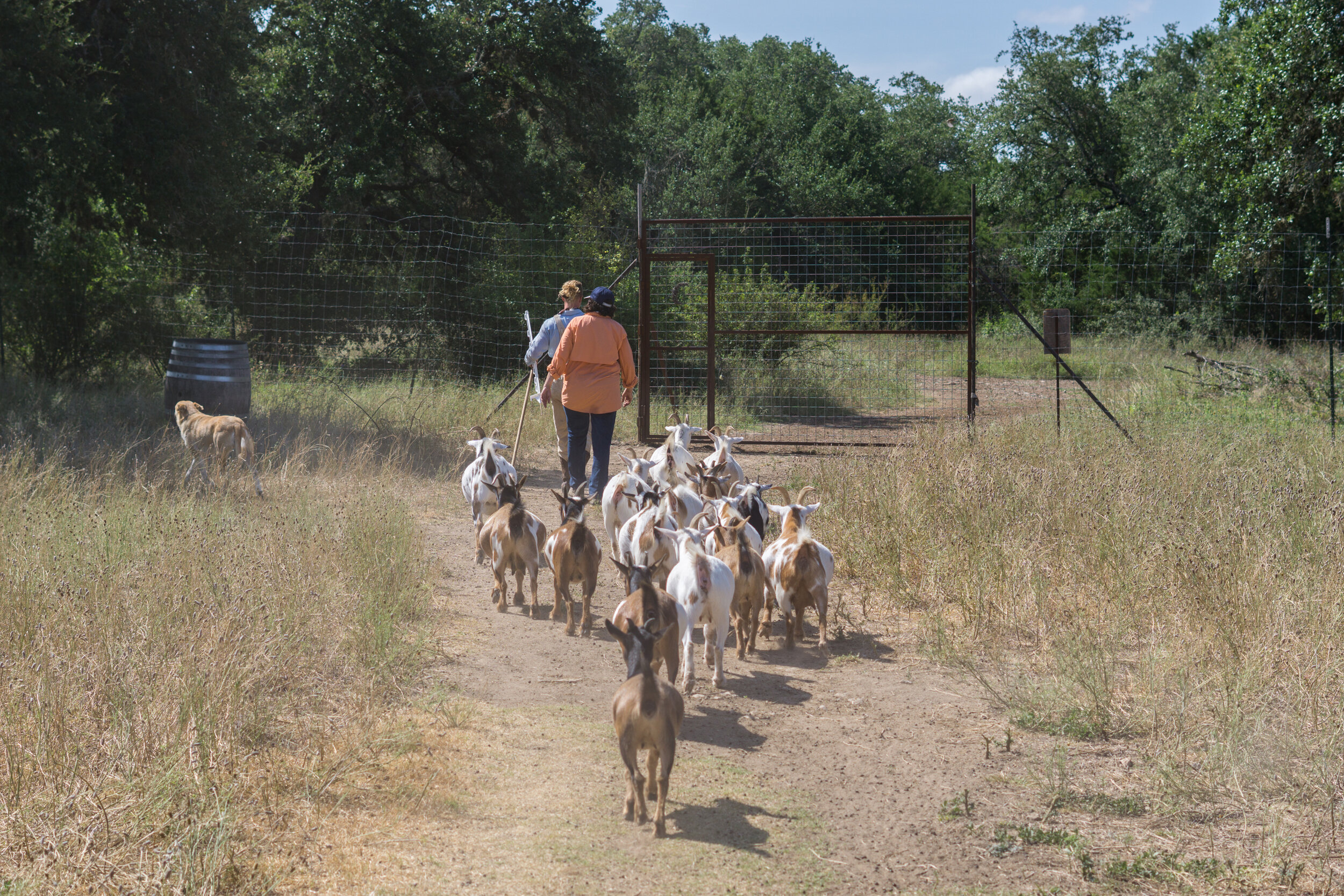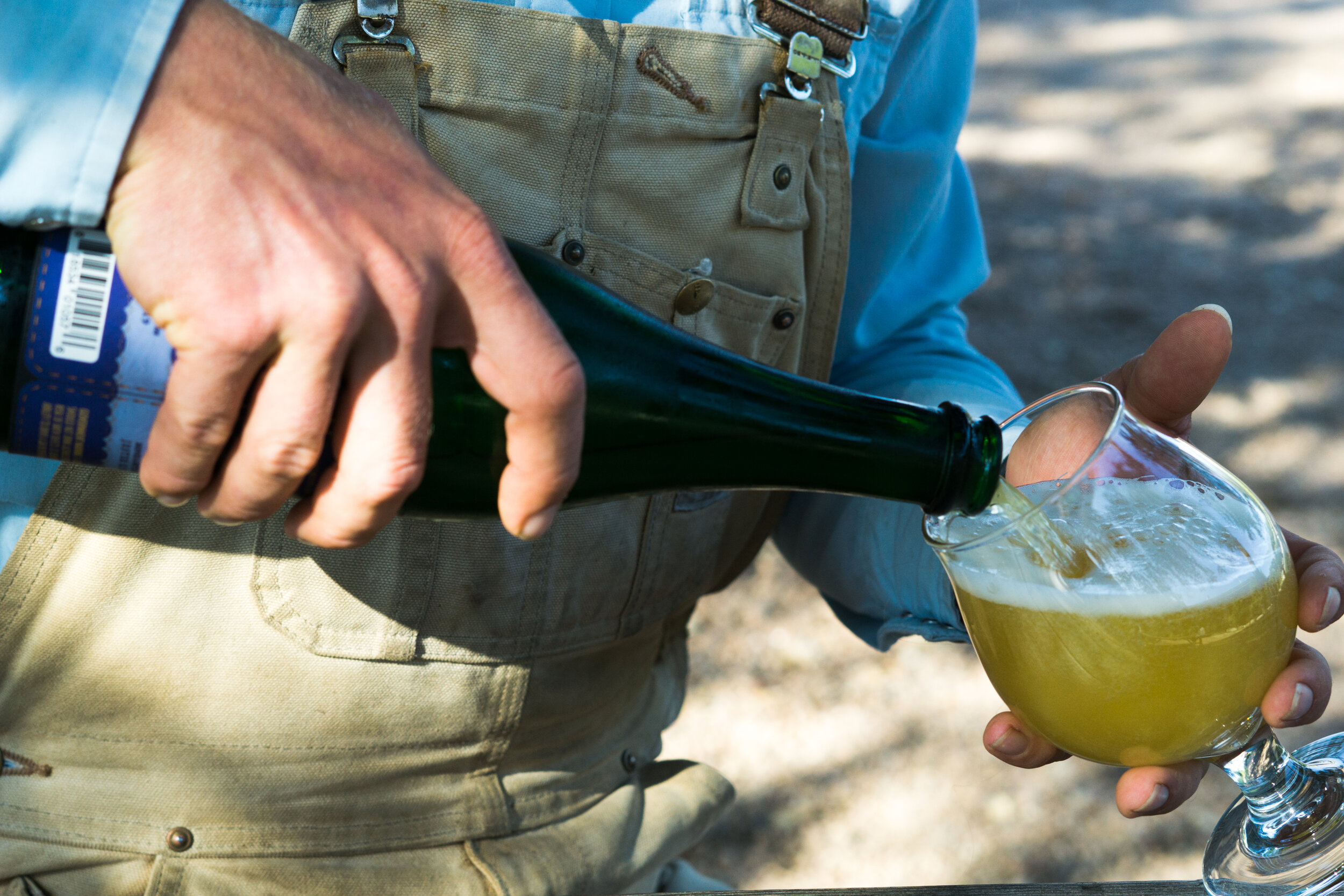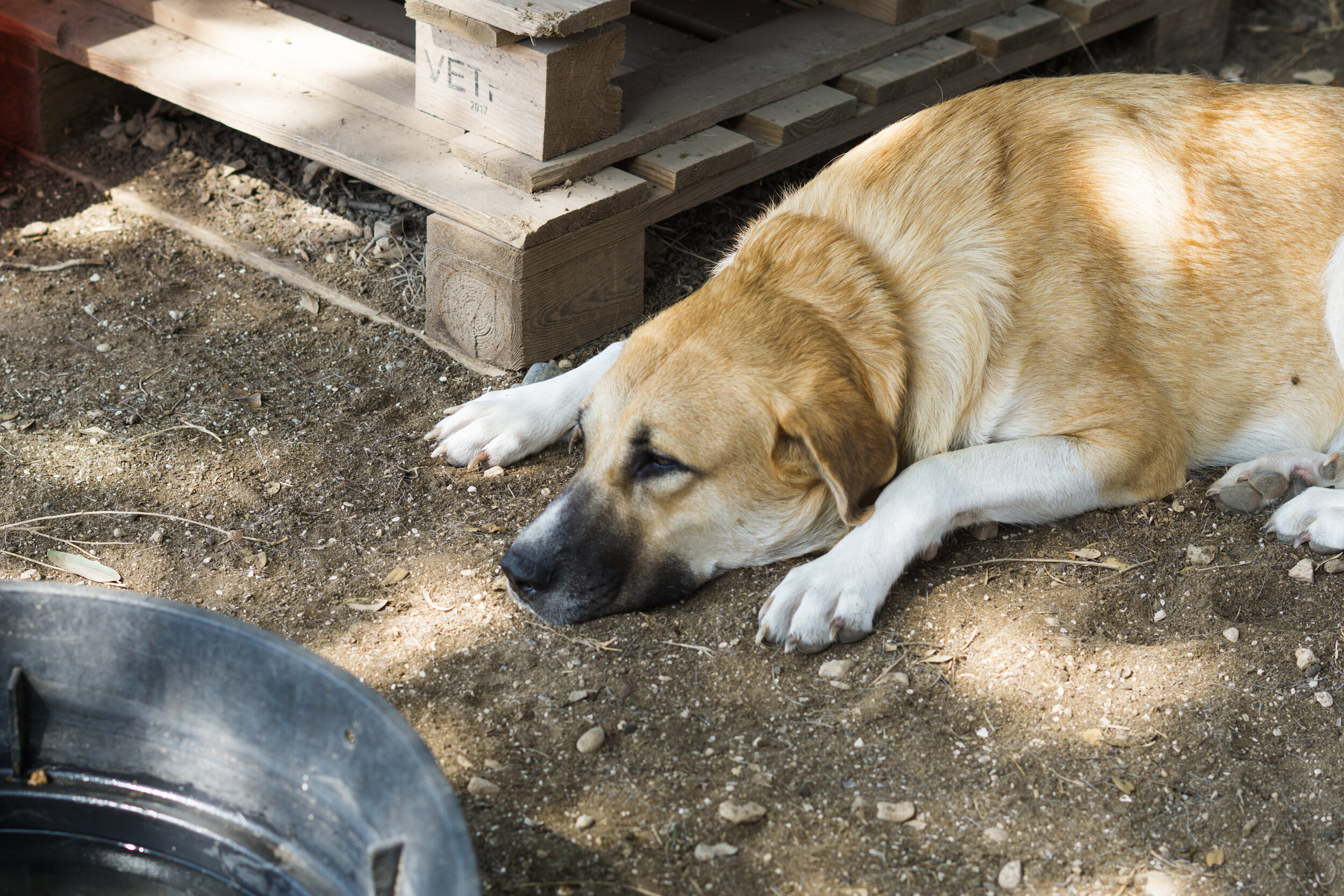“Interested in a breakfast Teeter?” Sean “Peppy” Meyer, Jester King Brewery’s farmer, asks as he saunters into the midmorning sun. By “Teeter,” he means Le Petit Prince, the brewery’s famed Farmhouse Table Beer: a fitting treat at any time of day and, as we’ll soon discover, also a useful tonic when calming the nerves of an anxious goat. Meyer’s offering comes at the beginning of a busy day of setting temporary fences, teaching and training his summer apprentice, and looking after his herd.
Meyer finds himself in a unique situation at Jester King, particularly as the brewery moves towards a groundbreaking, closed-loop system. Its property sits in the Hill Country, just west of Austin, Texas. A majority of its land was recently purchased, not just to prevent it from turning into housing developments, but also to cultivate produce and ingredients for the brewery, its restaurant, and the surrounding community. Meyer took up the job as farmer in early 2018, and has already left a lasting impression on the land—and on visitors like myself.
Initially, Meyer has an energy that can leave you weary if you haven’t spent much time around him. His shock of curly blonde hair, left long on top and shaved on the sides, gives him the look of a Norwegian raider from times past. Usually clad in pearl-snap shirts and overalls, he speaks with a rapid-fire patter, and doesn’t hide his ambitions.
In a past life, he worked in PR and advertising in Virginia but, in search of more enlightened living, eventually found himself in Austin. There, he was a driving force behind the urban farm outfit Get Well Farms, which was first conceived of to feed the local community, but later pivoted to agricultural education. Eventually, a sponsorship with Jester King put the brewery on Meyer’s radar, and, before long, he had expanded from a small patch of land in northeast Austin to nearly 200 acres in the Hill Country.
Since then, thanks to one of the marketing world’s best tools—cuteness—Meyer’s farming endeavors, and the goats in particular, have become a star attraction at the brewery. Is it a trip to Jester King without Instagramming its cloven-hoofed flock? But there’s much more he wants you to know about the place, beyond the furry, social-media celebrities.
Meyer is here as a steward of the land, and, as such, he’s inclined to erupt into fireballs of ecological proselytizing. “Fuck your lawn,” he might exclaim during the course of a conversation. His efforts to reeducate visitors usually come out a little gruff, but he can't help taking advantage of the opportunity, and is always eager to spread the word about bringing balance back to the local ecosystem. Part of his work at Jester King is to re-energize the land, so that prairie grasses and native species can once again thrive.
“The number-one irrigated crop in America—corn? Soy? Lawns,” he continues. Before you realize it, an afternoon of drinking with goats in the sunshine can turn into a pitch to tear up your lawn and start over. Meyer sees and understands the societal roadblocks that go into convincing your homeowners association that growing four-foot-tall prairie grasses in your front yard is better for the Earth’s property value long-term, but yearns for that larger shift in outlook.
“Having to change perspective as opposed to having to change the ecology is much simpler. We can achieve that in five years,” he says. And he thinks the beer industry is one of the best vehicles to reeducate those consumers and achieve these goals. “Every brewery, if community means something to you, next to your Pattinson and the Water, Malt, Yeast, Hops books, I’d like to see Wendell Berry [on your bookshelf]. [He] speaks to the only future for America being a focus on towns.” Small breweries in every town, in Meyer’s eyes, would provide a meeting place for agricultural, cultural, and community education.
Our glasses of Petit Prince are long empty by now, and there’s work to be done. Joining us is Vee, a Connecticut resident and teacher who has been working alongside Meyer this summer. She’s learning about land management and hopes to have a small goat herd of her own one day, down the road on family property near Dripping Springs. One of the goats has been ill and has an infection, which Vee will be learning how to treat. I’ll save the gruesome details, but today’s treatment involves an injection in a rather uncomfortable place. We grab another bottle of Teeter, for us and the goat, and begin the stroll to the barn.
As we go, signs of Jester King’s agricultural future are visible—Neomexicanus hop bines slither halfway up strands of rope along the walkway, wildflowers grow in abundance as part of the land’s rejuvenation, and farther afield, grapes are cultivated for eventual use in brewing and winemaking. We reach the goat barn and are greeted by Sasha: Meyer’s affable pup, and the self-appointed head of goat protection services. She’s anxious to eat some food undisturbed since one of the goats, herd matriarch Luna, has been swiping her kibble. After Meyer gives Luna the “I’m-not-angry-I’m-just-disappointed” dad talk, which she seems to actually take on board, we move on to the task at hand.
I have to point something out: these goats respond to Meyer’s presence in an absolutely uncanny way. It’s not an alpha/beta relationship of dominance; it’s mutual affection and codependency. This might be a lot to infer, but if you ever stand by as he moves with his flock, you’ll get it.
As we stand in the pen as Vee prepares the syringe, the anxiety feels familiar—like those first few trips to the dentist as a kid. Unfortunately, my dentist didn’t have a floral, dry and bitter Farmhouse Beer available to quench my fear. A few sips of Teeter and a few soothing words from Meyer and the goat is as ready as she’ll ever be. Vee deftly injects the medicine and without much struggle, our patient returns to munching on some grass. (If you have any further questions about the viability and safety of a goat drinking beer, I’ll refer you to the Mayor of Terlingua, Texas: a magnanimous leader who also happens to be another beer-drinking goat.)
Now that that task is off the list, we have a field to clear. Thankfully there’s no need to do this strenuous work ourselves—we have a herd of friends champing at the bit to lend us a hand. A temporary fence surrounds a section of land set aside for the cultivation of seasonal crops (next squash, eventually pumpkins). Since the last harvest, it’s been overrun with wildflowers and other plants. The goats follow Meyer’s lead, and with a little encouragement from Vee at the back of the herd, take to pasture in this fenced-in smorgasboard. Here they’ll stay for a few hours, which allows us a moment of respite in the shade.
Returning to a picnic table situated under a chandelier hanging from a shade tree, we dig back into our conversation. Sitting across the table from Meyer, you can see two sides of the man: the frenetic evangelist who wants you to treat our lands better, and the guy who would much rather be soaking doom metal into his bones at a Sleep show. He wants you to be tough: “In order to encourage yourself to get healthier, get punched in the face,” is his explanation for the fight training he partakes in, in order to avoid injuries on the farm. But most of all, at the heart of it all, he wants you to be thoughtful—how can you venture, beer in hand, to leave this world a better place?
For Meyer, his personal vision looks something like this: in 10 years, he hopes to see three or four bison bulldozing ash juniper on the lands of Jester King, and, if the zoological permits and insurance work out, a few endangered red wolves making babies to be reintroduced to lands now overwhelmed with deer and coyotes. Natural grasses will return and thrive alongside terraced vineyards along one part of the property, and a market garden will serve the restaurant and local community. He understands the unique position Jester King offers. “It’s a couple of steps of separation from, uhh, wolves to beer,” he laughs while he expounds on this plan. But he also knows that, without the beer, he wouldn’t be here at all.
There are probably other farmers out there who could do what Meyer is doing here, but I can’t imagine anyone else connecting more deeply to the unique environment Jester King provides. Most others wouldn’t have slept in the goat barn for a while. Or set up a strength-training area among the scraggly trees on one of the property’s hills. Or used the exuberance of the beer consumer to their advantage to spread the message of ecological rejuvenation. After a long day, he finds simple pleasure in running with the goats and sipping a Teeter while they graze and the sun goes down. “It’s why I ended up here,” he says. “It’s hard work and I just hope that while I’m here, I can serve the kingdom well.”



























